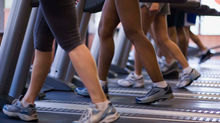Perimenopause and Weight Gain

Tell me does this sound familiar? You’re age 40+ going about your business getting ready for your day and then BAM!... you notice your clothes have gotten tighter and realize you feel and look a little bloated lately. Like WTF? Did this just happen overnight?
Welcome to perimenopause! Is it total bulls#@t we women have to go through this? Yes… but let’s break this down and take one step on how we can make all this better. Ready?
First, what is perimenopause? I know you’re thinking…I thought you go into menopause and done, wipe my hands clean. Uhh… nope! (No worries, nobody explained this to me either.)
Perimenopause is a “wonderful” time BEFORE we hit menopause where we experience mood swings, brain fog, insomnia, lack of concentration, memory trouble AND weight gain. Sounds like our wild ride of monthly PMS and postnatal symptoms of the past doesn’t it? It’s also the time when our menstrual cycle is inconsistent. It can be every other month, every 3 months or longer. Don’t kill the messenger, but perimenopause can last up to 10 years! It all depends on each woman individually.
It’s the time when you miss your period for 12 months or more, is when you officially transition to menopause. The time of the inconsistencies and change before all that, you’re in the peri stage.
What can you do to reduce these crazy symptoms and help your body and sanity smoothly transition like a pro? There are many ways to improve our wellbeing during this time (I will cover more in upcoming blog posts), but one small step is to eat breakfast!
A couple reasons why you are feeling the common extra weight gain is because of hormones and your muscle mass.
Muscle mass starts to decline as we approach this perimenopause stage. Muscle burns calories and when muscle mass declines there is less energy to burn leading to weight gain.
Another factor during the perimenopause stage is the hunger hormone ghrelin increases and the hormone leptin that keeps us full decreases.
Let’s do the math… less leptin and more ghrelin = decrease of feeling full after eating and increase of hunger… Isn’t that super?
Ok, ok, let’s get back to breakfast! One action step you can take to help your body backpedal on these changes is to focus on what we eat. Starting your day with the right kind of breakfast that’s full of nutrients you need to help reverse these crazy changes happening.
Preparing a breakfast full of protein and fiber into your mornings will help maintain your muscle, as well as balance out good olé ghrelin and leptin. These foods will increase your metabolic rate (the rate on how your body burns energy/calories) and help lose/maintain your weight.
Protein rich foods will help you feel fuller longer and help your muscles stay strong. Foods high in protein include eggs, seafood, (must try my salmon spinach omelet-recipe coming soon!), nuts, beans and lentils.
High fiber foods are super important to stabilize blood sugars and reduce cravings. High fiber foods can also help decrease your risk of diabetes, cardiovascular disease and feed your gut with friendly microbes too! Yay!
High fiber foods include vegetables (leafy greens, peas, sweet potatoes etc.…), fruits (apples, blueberries, avocados), grains (quinoa, oats, wild rice), seeds, beans and lentils as well.
So, think twice when you prepare your morning eats and don’t skip! Think protein and fiber and notice how you feel after eating these nutrient dense foods. You may be surprised that you will not only start to feel more energized, but your clothes may start to fit just the way you want them too!













